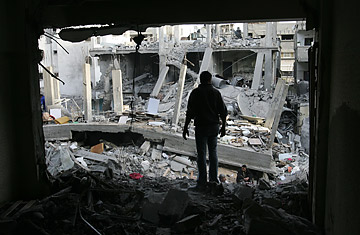
A Palestinian man inspects destroyed homes after an Israeli military strike on January 14, 2009, in Gaza City, Gaza Strip.
As Israeli bombardments and fighting in Gaza pushed the reported Palestinian death toll above 1,000 on Wednesday, negotiators for Hamas, the Islamic militants who rule Gaza and are firing rockets into Israel, showed signs of softening their defiance to Egypt's attempt to broker a ceasefire. In Cairo, a Hamas spokesman appeared more conciliatory toward the Egyptian peace plan and said that the Islamist leadership, both in Gaza and in Damascus, would be studying the latest Egyptian proposal, whose contents have yet to be disclosed. One Hamas source told TIME, "We've moved a step forward, and now we're going to test the Egyptian's influence on Israel."
A Hamas leader speaking in Cairo, Salah Bardaweel, insists that the Islamists aren't budging from their initial demands: "We will accept nothing less than a ceasefire, the complete withdrawal of Israeli troops from Gaza, and the lifting of the [18-month long] Israeli siege on Gaza." It isn't clear yet how close the Egyptian proposal mirrored Hamas' demands for a cease-fire in the 19 day-old conflict. When the assault started, Palestinians accused Egypt of catering to Israel (Cairo had just played host to Israeli Foreign Minister Tzipi Livni). The Hamas source commented pessimistically, "We're 100% sure that Israel won't accept our demands, but let's see how far the Egyptians get with them." Israeli Prime Minister Ehud Olmert held a late-night meeting with his advisers to brief envoy Amos Gilad, who flies to Cairo Thursday for talks with the Egyptians. (See pictures of Israeli soldiers sweeping into Gaza.)
Hamas sources say that the impasse between the Egyptians and Hamas was broken by Turkish envoy Ahmad Oglu who volunteered Turkish forces to be placed along the Egyptian-Gaza border to stop arms trafficking. Hamas has agreed to the Turkish offer, this source says. Before withdrawing troops and tanks, Israel wants a guarantee that the Egyptian border will be sealed off so that Hamas can no longer smuggle in Iranian-made rockets to shoot at Israeli cities. So far, Israel and Hamas have failed to agree on the length of the ceasefire proposed by the Egyptians. Israel wants a 10-year truce, while Hamas is insisting on a single year, this well-placed Hamas source told TIME.
Other Palestinian sources say that Hamas delegates were warned by the Egyptians that unless they agreed to a truce, Israel would launch a major ground assault into Gaza City, one of the most crowded places on earth, which risks raising the death toll far higher. Palestinian medical sources say that more than 300 children have died in the Gaza fighting. (See pictures of the heartbreak in the Middle East.)
The next step is getting the Israelis to accept. Israeli officials say a bitter feud has erupted between Prime Minister Ehud Olmert and his Defense Minister Ehud Barak over how long to prolong the Gaza assault. Barak says he is ready for a truce, arguing that Hamas has suffered a punishing blow from the Israeli blitzkrieg and the next step — sending troops into Gaza City's crowded streets — could raise the casualty figures far higher among Palestinian civilians and Israeli soldiers. But Olmert wants to press on until Hamas' leadership and 15,OOO to 20,000 fighters are weakened even more, say officials.
Even if Hamas does agree to a cease-fire, it must persuade other radical militant groups to sign on. Hamas sources told TIME that the other main militant group in Gaza, Islamic Jihad, wants to keep fighting, despite its many casualties. Israeli officials say they have killed hundreds of militants but say privately that there's no way of knowing yet how severe a blow this is to Hamas' military command, which is operating from well-hidden underground bunkers.
TIME's Azmy Keshawi reported by telephone from Gaza that Israeli tanks were advancing on Gaza City along the coastal road, backed by heavy shelling from navy gunships. "One navy shell hit a 13-story apartment building," says Keshawi. "Then when the fire trucks arrived and the firemen were carrying out the injured, a second shell struck the building, and through the clouds of dust I could see many were wounded."
Meanwhile, Syrian President Bashar al-Assad warned Israel in a television interview that Israel's attack on Gaza is "sowing seeds of extremism" around the Arab world. His words may prove prophetic: yesterday an audio message purportedly from al-Qaeda's fugitive leader, Osama bin Laden, surfaced calling on Muslims to wage a holy war against Israel. With reporting by Jamil Hamad/Bethlehem and Aaron J. Klein/Jerusalem
